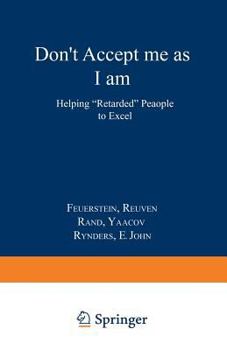Don't Accept Me as I Am
Select Format
Select Condition 
Book Overview
No Synopsis Available.
Format:Paperback
Language:English
ISBN:0306429640
ISBN13:9780306429644
Release Date:January 1988
Publisher:Springer
Length:322 Pages
Weight:1.38 lbs.
Dimensions:0.7" x 5.5" x 8.5"
Customer Reviews
2 ratings
The title says it all.
Published by Thriftbooks.com User , 22 years ago
The title of this text is the best part of the book. Feuerstein's thesis is that in order to help Down Syndrome ("DS") children, the almost banal expression "Accept me [him] as I am [he is]" is definitely not the way to go. Instead, the idea is to challenge the retarded child in a manner that does not set out pre-established limits. Feurstein et al base their cognitive theories on the basic premise of the ability to modify. Chapter 2 is an excellent discussion of the two opposing schools of thought in connection with retarded children: (a) the passive-acceptant ("PA") approach versus Feuerstein's active-modification ("AM") theory. As the name implies, the PA approach is one based on a passive acceptance of the child's handicap, and a well-meaning and even loving desire not to set what at first would seem like unattainable goals. In fact, there are few (if any) expectations for the handicapped person. They arise from well-meaning people that would like to shelter the DS child from a cruel and uncaring world by making sure that he is educated only with other DS children and that only very modest expectations can be held as to cognitive development.Feuerstein's AM approach, on the other hand, is not any less "loving" than the PA approach, but it does not accept the handicap (physical or mental) as some sort of fatalistic impediment to growth and development. Instead, he proposes that the handicaps (and some much more severe than DS) can be modified and some can be overcome, and that a lack of challenging goals and hard work can easily become self-fulfilling prophesy in terms of growth for children with limitations. Handicapped children need to be fully integrated with "normal" children as the only way to obtain excellence in achieving these goals. This is similar to the "conductive education" theory which does not accept the physical condition of the individual as setting unsurpassable barriers to functional change (cf. Dr. Petö in Budapest, and his successor, Dr. Maria Hari). Crucial to the AM approach is the active involvement not only of the educator/mediator but also of the retarded child. The goal of modifying the handicap involves hard work that should not be carried out on behalf of, or for the child, but instead with and through him. In essence, AM is not a patronizing approach. Feurstein et al demonstrate that DS children and others with low IQs should not "wither away in institutions." These children are "neither hopeless nor helpless, and certainly not deserving of society's disparagement or pity." Children with intelligence limitations can lead "rich, active, joyous, and even independent lives as contributors to society." Ultimately, that attitude shows more true caring than one which gives up before trying.Despite what seem like very good ideas and concepts, Feuerstein promises in the early chapters much more than he delivers in this text. The book is full of unnecessary jargon, placed into acronyms to make it even mo
How the rich get richer and the poor get poorer
Published by Thriftbooks.com User , 24 years ago
This was the first book that I read by this researcher, after reading a small article in a magazine. Feurerstein clearly explains how a learning disability is self referencing. The disability usually induces an environment which offers less opportunities to learn and so the individual learns less,and as a result his environment becomes even less generous. Feurerstein offers strategies for parents and educators to counteract this tendency of the disability to imbed itself. It gives clear names for the cognitive functions which are the tools of thinking, and shows how parents and educators can train themselves to become aware of these behaviours or the lack of them. The diagnostic procedures look not for an average of abilities but for areas of strength and weakness and most importantly for potential to learn in any area. Building upon strength rather than supporting weakness is the basic idea. Feurerstein exposes the dangers of overeliance on concrete aids for students who have difficulty reasoning abstractly. Instead he suggests that they should be taught to reason abstractly, and then shows us how. Some of the language in this book is offputting for the non-academic person and some of the things described may be confronting.






